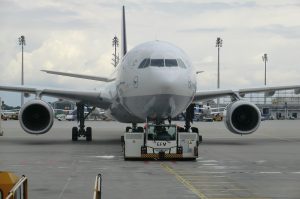 Airbus has grounded some of its A320neo jets due to teething problems with the jets’ Pratt engines.
Airbus has grounded some of its A320neo jets due to teething problems with the jets’ Pratt engines.
As reported by Bloomberg, the European aerospace manufacturer has temporarily postponed some of its deliveries after engine issues were discovered. The A320neo jets are powered by Pratt & Whitney engines, which says it working closely with government regulators to address and resolve the problem.
The budget airline IndiGo said its experienced three in-flight shutdowns while flying the Airbus A320neo, prompting pilots to turn back around to the airport. Following these incidents, Air travel safety regulators in Europe issues a warning about the possible shutdown with the A320neo’s Pratt & Whitney engines. Pratt issued its own statement shortly thereafter, saying the issue affects 43 engines on 32 A320neo jets. Pratt also said it was analyzing 55 other engines delivered to Airbus that may be susceptible to the same in-flight shutdown issue.
So, what’s causing the Pratt & Whitney engines to shut down during mid-flight? Pratt says the problem originates from the high-compressor in the back of the engine, which the company recently changed to create a “knife-edge seal.”
According to Airbus, 13 airlines are flying its A320neo jets with Pratt & Whitney engines. In total, Pratt & Whitney has delivered roughly 550 engine, though it claims only 15 to 20 aircraft are affected by the in-flight shutdown issue.
The A320neo is a line of narrow-body jets launched December 1, 2010 by Airbus. The term “neo” stands for “new,” indicating the jets have a new engine option, some of which include the CFM International LEAP-1A or Pratt & Whitney PW1000G engines. The original line of jets is called the A320ceo, with “ceo” meaning “current engine option.” Airbus successfully flew its first A320neo on September 25, 2014. Since then, it’s become an increasingly popular line of jets, rivaling the likes of its competitor Boeing.
To put the popularity of the A320neo jets into perspective, some 30 carriers throughout the world fly the narrow-body aircraft. The largest carrier to fly the A320neo is IndiGo, which has a fleet of some 29 A320neo jets.
So, how will this latest issue with the A320neo’s Pratt & Whitney engines affect Airbus’s sales? When news of the engines’ in-flight failure first emerged, stock shares of Airbus fell by 3%. However, most market analysts are confident that Airbus will address the issue. Pratt & Whitney engines have suffered from mechanical problems in the past, and Airbus has resolved them in a timely manner. There’s no evidence indicating this time will be any different. Airbus and Pratt & Whitney will likely tackle this issue while keeping the A320neos in service.



